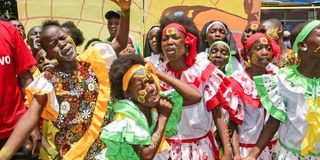Conflict, power key topics at Kenya Schools and Colleges National Drama and Film Festival

Mungavo Primary School pupils present a Luhya dance at the 62nd edition of the Kenya Schools and Colleges National Drama Festival at Embu University on April 12, 2024.
Performances that question why Africa has not taken advantage of its immense mineral resources dominated Day 5 presentations at the ongoing 62nd edition of the Kenya Schools and Colleges National Drama and Film Festival at the University of Embu.
Other performances featured tribalism, corruption, family and global conflicts.
Mt Kenya University (MKU) presented a play dubbed Parasite, which took a swipe at African nations for over-dependence on the West, while they (the super-powers) took the opportunity to siphon the immense mineral resources from Africa for their own benefit.
The play written and directed by Oliver Minishi, thrilled the audience with the clear characterisation among the performers.
MKU also presented a hilarious narrative titled -Disco Katanga about a group of individuals who, after facing numerous challenges in their pursuit of employment, find themselves unexpectedly thrust into roles within the county government.
However, their positions turn out to be different from what they were led to believe, leading to a series of unfortunate events involving malfunctioning equipment and a bad accident.
Through this ordeal, they come to realise the importance of speaking up and taking action, ultimately transitioning into a career as professional mourners, where they use their newfound talent to offer solace to those in need.
Mr Anthony Macharia and Jacob Koli carried the day with their powerful narration techniques.
The university category provided stiff competition with other theatre powerhouses; the University of Nairobi, Zetech, Meru, Jkuat, Alupe, Laikipia and Kabarak universities giving their best performances on stage.
At the Film Hall for secondary schools, Mii Secondary School screened a choral verse-Jozi la Chozi scripted by Shadrack Kamande and produced by Mary Mutua.
Jozi la Chozi is a Kiswahili phrase which denotes family conflict. In this verse, the students illustrate the theme of Family breakup, children dropping out of school, roaming on the streets hopelessly and temptations luring them to meet their daily needs.
What is the lesser evil getting pregnant while in school or getting married off when at school? And is procuring an abortion the lesser evil?
These are tough questions which St Georges School from Nairobi posed to the audience in their play “The lesser evil.”
The play is centred on a character, Napeiyok, who was the beacon of great hope, excellent performance and discipline at Kana Girls School got herself pregnant, and this changed her mindset and that of the parents to start thinking about the three major lesser evils to follow.
There was also a happy moment at Hall 4 for Teachers Training Colleges when Kenyenya Teachers Training College, in Kisii presented a play on shortcomings in our society. The shortcomings rage from tribalism, corruption etc.
Friend School Kamusinga presented a narrative “Mambo” which thrilled the audience with its hilarious contents and rendition. At one point one could confuse the narrative to a stand-up comedy. The narrative is written and directed by Wamboko Ibrahim and produced by Paul Weloba.
Asumbi Teachers Training College presented a creative cultural dance “Apondi’.
Apondi, a young girl from a poor family, having passed her exams finds herself between a rock and a hard place, having to contend with the reality of being dumped by her newly found lover, she is however lucky as her mother gets her back to college to train as a teacher .
At the Film Hall, a documentary by Ainsworth School Primary and Junior School produced by Mishael Mose was well received by the audience.
In a world torn apart by conflict, the resilience of the human spirit shines brightest in the face of adversity.
For Amina and her family, the civil war in Somalia left them with nothing but shattered dreams and a longing for a better life. Displaced by the ravages of civil war, Amina’s family sought refuge in Kakuma Refugee Camp, where they endured hardships for too long years.
But even amidst the turmoil, Amina held on to an unwavering dream: the pursuit of education.
Determined to acquire proper education, Amina ventured into the unknown streets of Nairobi, her future uncertain but her resolve unshakeable.
It was here, amidst the hustle and bustle of the city, that Amina’s journey would take a new turn for the better. At 17 years old she was enrolled in Grade 3 at Ainsworth School.
The narrator Mambo was a critic of some Radio show programmes which connect friends on live air talk. One time the school boy Mambo called the station live and sought to be connected with madam Zipora, their school English teacher.
Madam Zipora picked the phone and the presenter told her that a secret admirer would want to be connected to her: “Hallow madam Zipora, I want to be connected with you emotionally, geographically scientifically… especially on that topic of valleys hills.” Student Mambo laid down his proposal to her teacher “No bwana mambo mimi niko na bwana” Madam Zipora answered but witty mambo replied “mke mwema hutoka kwa bwana” Madam Zipora agrees to meet Mambo at the School rugby pitch at night.
Mambo availed himself at the Schools Rugby pitch as agreed on the Radio life talk show, but to his surprise Madam Zipora was not there.
As master Mambo wondered under the cover of the night at the School Rugby pitch on what might have gone wrong he was grabbed at the back.
He turned with a lovely smile. To his surprise it was the School Principal Mr Nyati, behind him was Madam Zipora.
The smile evaporated “Kijana” the principal Nyati retorted “are you playing Rugby at night” hell broke loose “Mambo where did you learn these silly tricks from? Madam Zipora asked as mambo fearfully answered “from the Radio talk show called Patano show.”




